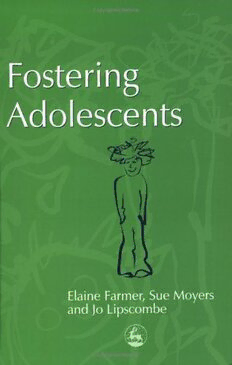
Fostering Adolescents (Supporting Parents) PDF
258 Pages·2004·1.138 MB·English
Most books are stored in the elastic cloud where traffic is expensive. For this reason, we have a limit on daily download.
Preview Fostering Adolescents (Supporting Parents)
Description:
Adolescents are the hardest group to foster and have high rates of placement breakdown. Elaine Farmer and her colleagues examine what helps to make their placements work. Key issues for this age group are explored, including peer relationships, sexual health and relationships, the impact of the adolescent on the foster family and balancing their need for safety and autonomy. Based on government-commissioned research and part of the Supporting Parents initiative, this book addresses each stage of the care process, from placement selection to leaving foster care. The authors consider which kinds of professional support at which stages make a difference, the foster carer parenting skills that are crucial and how foster carers can draw on professional support to manage adolescents' behaviour, maintain their educational attainments and negotiate ongoing contact with their birth parents. They draw out recommendations for policy and practice in the areas of: *how strain on carers can be reduced *the role foster carers' own children play in placement success or breakdown *single foster carers *how to contain the young people who are hardest to foster *key training requirements for foster carers *managing contact *how foster carers and social workers respond to gender differences in teenagers. A rich source of recommendations for social workers, policy makers and carers, this book will be invaluable to anyone involved in the fields of child welfare and child protection.
See more
The list of books you might like
Most books are stored in the elastic cloud where traffic is expensive. For this reason, we have a limit on daily download.
